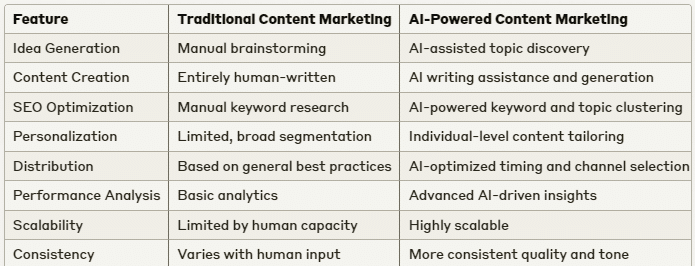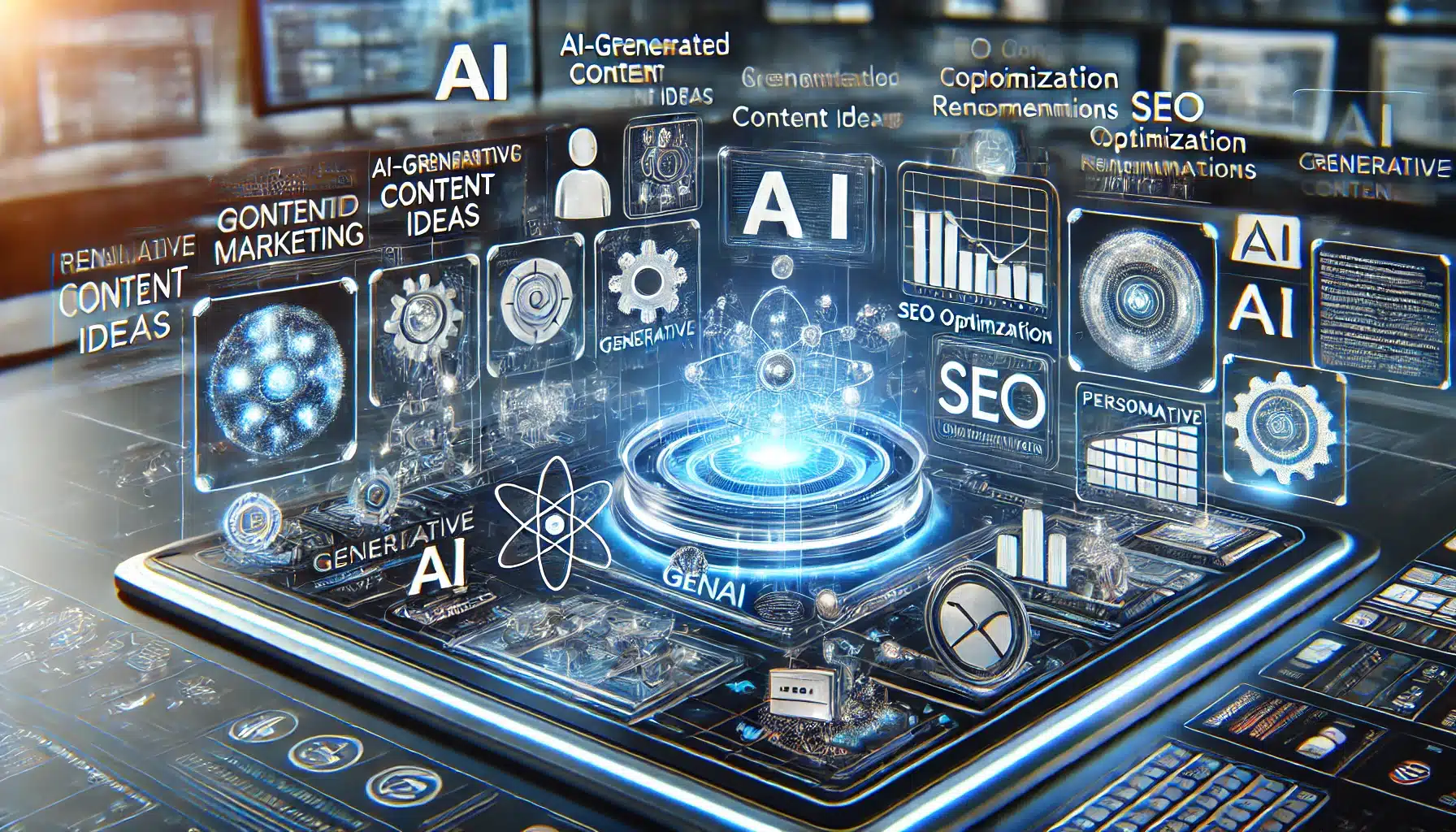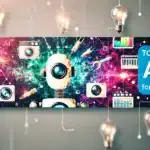Introduction: The Dawn of AI-Powered Content Marketing
In the ever-evolving digital landscape, content marketing has become a cornerstone of successful business strategies. However, with the increasing demand for high-quality, relevant content, marketers face significant challenges in consistently producing engaging material that resonates with their target audience. Enter Artificial Intelligence (AI) – a game-changing technology that’s transforming the content marketing landscape.
This comprehensive guide will explore how AI is revolutionizing content marketing, from generating innovative ideas to optimizing for search engines and personalizing content for diverse audiences. We’ll delve into the various AI technologies driving this transformation and examine how businesses can leverage AI automation, generative AI (GenAI), and other AI-powered tools to boost their content marketing efforts and overall business productivity.
Understanding AI in Content Marketing: The Fundamentals
Defining AI-Powered Content Marketing
AI-powered content marketing refers to the use of artificial intelligence and machine learning algorithms to assist in various aspects of content creation, optimization, and distribution. This technology enables marketers to streamline their workflows, enhance creativity, and deliver more targeted and effective content to their audiences.
Key Components of AI in Content Marketing
- Natural Language Processing (NLP)
- Machine Learning Algorithms
- Predictive Analytics
- Natural Language Generation (NLG)
- Computer Vision
- Sentiment Analysis
- Automated Content Curation
The AI Content Marketing Process
- Data Collection and Analysis: Gathering insights from various sources
- Idea Generation: Using AI to brainstorm content topics and angles
- Content Creation: Leveraging AI writing assistants and generators
- SEO Optimization: Applying AI-powered tools for keyword research and optimization
- Personalization: Tailoring content to individual user preferences
- Distribution: Using AI to determine optimal channels and timing
- Performance Analysis: Employing AI analytics to measure and improve content effectiveness
The Evolution of Content Marketing: From Manual Creation to AI-Assisted Production
Traditional Content Marketing Approaches
Historically, content marketing relied heavily on manual processes, from brainstorming ideas to crafting and distributing content. This approach, while effective, was often time-consuming and limited in scale.
The Rise of Digital Tools and Basic Automation
The digital era brought more sophisticated tools for content creation and management, allowing marketers to streamline some aspects of their workflow.
The AI Revolution in Content Marketing
The integration of AI has transformed content marketing from a largely manual practice to a data-driven, scientifically precise discipline. AI-powered tools now assist in every stage of the content marketing process, from ideation to distribution and analysis.
Comparison Table: Traditional vs. AI-Powered Content Marketing

How AI Enhances Content Marketing Capabilities
Innovative Idea Generation
AI algorithms can analyze vast amounts of data from various sources to identify trending topics, content gaps, and unique angles for content creation.
Streamlined Content Creation
AI-powered writing assistants and content generators can help create drafts, suggest improvements, and even generate entire articles based on given parameters.
Advanced SEO Optimization
AI tools can perform in-depth keyword research, suggest optimal content structures, and provide real-time optimization recommendations.
Personalized Content Experiences
By leveraging user data and machine learning, AI can tailor content to individual preferences, increasing engagement and conversion rates.
Efficient Content Distribution
AI can determine the most effective channels and timing for content distribution, maximizing reach and impact.
Predictive Performance Analysis
Advanced AI analytics can forecast content performance and suggest improvements before publication.
Automated Content Curation
AI algorithms can sift through vast amounts of content to curate relevant, high-quality materials for target audiences.
AI Technologies Driving Content Marketing Innovation
Natural Language Processing (NLP) for Content Analysis
NLP enables AI systems to understand and analyze human language, allowing for more accurate content optimization and topic clustering.
Machine Learning for Predictive Analytics
Machine learning algorithms can identify patterns in content performance data, predicting which types of content will resonate with specific audiences.
Natural Language Generation (NLG) for Content Creation
NLG technology can generate human-like text, assisting in the creation of various content types, from product descriptions to data-driven reports.
Computer Vision for Visual Content Optimization
AI-powered image recognition can analyze and optimize visual content, improving engagement and SEO performance.
Sentiment Analysis for Audience Insights
By analyzing social media and customer feedback, AI can gauge audience sentiment and inform content strategy.
Reinforcement Learning for Content Strategy Optimization
This AI technique helps refine content strategies over time by learning from the performance of previous content pieces.
AI-Powered Tools for Content Marketing
Content Idea Generators
Tools like HubSpot’s Content Strategy Tool and MarketMuse use AI to suggest relevant topics and content ideas based on your target keywords and audience interests.
AI Writing Assistants
Platforms like Jasper.ai and Copy.ai offer AI-powered writing assistance, helping marketers create various types of content more efficiently.
SEO Optimization Tools
AI-driven SEO tools like Clearscope and Frase.io analyze top-ranking content and provide recommendations for optimizing your content for search engines.
Content Personalization Platforms
Solutions like Dynamic Yield and Optimizely use AI to deliver personalized content experiences to individual users across different channels.
AI-Powered Analytics Tools
Tools like Google’s AI-powered Analytics and Adobe’s Sensei offer advanced insights into content performance and audience behavior.
Automated Social Media Management
Platforms like Hootsuite and Buffer incorporate AI to optimize social media content scheduling and performance.
Industries Benefiting from AI in Content Marketing
E-commerce: Personalized Product Descriptions and Recommendations
AI helps e-commerce businesses create unique product descriptions at scale and deliver personalized content recommendations to shoppers.
Finance: Automated Financial Reports and Personalized Advice
Financial institutions use AI to generate data-driven reports and deliver personalized financial content to clients.
Healthcare: Patient Education and Personalized Health Content
AI assists in creating accurate, up-to-date health information and tailoring content to individual patient needs.
Travel and Hospitality: Destination Guides and Personalized Itineraries
Travel companies leverage AI to create comprehensive destination guides and offer personalized travel content based on user preferences.
Technology: Technical Documentation and User Guides
Tech companies use AI to generate and maintain complex technical documentation and user guides.
The Benefits of Implementing AI in Content Marketing
Increased Content Production Efficiency
AI tools can significantly speed up content creation processes, allowing marketers to produce more high-quality content in less time.
Improved Content Relevance and Engagement
By leveraging AI for personalization and topic selection, marketers can create more relevant content that resonates with their target audience.
Enhanced SEO Performance
AI-powered SEO tools help content rank higher in search results, increasing organic traffic and visibility.
Data-Driven Content Strategies
AI analytics provide deeper insights into content performance, enabling more informed strategic decisions.
Consistent Brand Voice
AI writing assistants can help maintain a consistent brand voice across all content pieces, regardless of the writer.
Scalable Personalization
AI enables personalization at scale, allowing businesses to deliver tailored content experiences to large audiences.
Cost-Effective Content Production
By automating certain aspects of content creation and optimization, AI can help reduce overall content production costs.
Challenges and Considerations in AI-Powered Content Marketing
Maintaining Creativity and Human Touch
While AI can assist in content creation, maintaining creativity and the human element in content is crucial for building authentic connections with audiences.
Ensuring Content Quality and Accuracy
AI-generated content may require human oversight to ensure accuracy, especially for specialized or sensitive topics.
Ethical Considerations in AI-Generated Content
As AI becomes more prevalent in content creation, marketers must navigate ethical considerations around disclosure and authenticity.
Data Privacy and Security
AI-powered personalization relies on user data, raising concerns about data privacy and security.
Integration with Existing Systems
Implementing AI tools may require integration with existing content management systems and workflows, which can be challenging.
Keeping Up with AI Advancements
The rapidly evolving AI landscape requires continuous learning and adaptation to leverage the latest technologies effectively.
The Future of AI in Content Marketing
Hyper-Personalized Content Experiences
Future AI systems will enable even more granular personalization, potentially creating unique content experiences for each user interaction.
Advanced Language Models for Content Creation
As language models like GPT continue to evolve, we can expect more sophisticated AI-generated content that’s nearly indistinguishable from human-written material.
AI-Driven Content Strategies
AI will play a larger role in developing overall content strategies, suggesting optimal content mixes and campaign structures.
Voice and Visual Content Optimization
With the rise of voice search and visual platforms, AI will become crucial in optimizing content for these mediums.
Real-Time Content Adaptation
AI systems will enable real-time content adaptation based on user behavior and contextual factors.
Predictive Content Performance
Advanced AI models will predict content performance with increasing accuracy, allowing for pre-emptive optimization.
Case Studies: AI Content Marketing Success Stories
E-commerce Giant Boosts Engagement with AI-Generated Product Descriptions
A major online retailer implemented an AI content generation system for product descriptions, resulting in a 30% increase in product page engagement and a 15% boost in conversion rates.
Financial Services Firm Increases Client Engagement with Personalized Content
A leading financial advisory firm used AI to analyze client data and deliver personalized financial content, leading to a 40% increase in newsletter open rates and a 25% rise in client engagement.
Healthcare Provider Improves Patient Education with AI-Powered Content
A large healthcare system leveraged AI to create and distribute personalized health education content, resulting in a 20% improvement in patient adherence to treatment plans.
Common Questions About AI in Content Marketing
Can AI completely replace human content creators?
While AI can assist and augment content creation, human creativity, strategic thinking, and emotional intelligence remain crucial for developing truly compelling content strategies.
How can small businesses leverage AI for content marketing?
Small businesses can start with affordable AI-powered tools for keyword research, content optimization, and basic content generation to improve their content marketing efforts without significant investment.
What are the limitations of current AI content generation tools?
Current AI tools may struggle with nuanced topics, humor, and emotional content. They also require human oversight to ensure accuracy and brand alignment.
How does AI-generated content affect SEO?
When used properly, AI can enhance SEO by helping create more relevant, optimized content. However, it’s important to ensure AI-generated content adds value and meets search engine guidelines.
What skills do content marketers need to work effectively with AI tools?
Content marketers should develop a basic understanding of AI capabilities, data analysis, and critical thinking skills to effectively leverage AI tools and interpret their outputs.
Implementing AI in Your Content Marketing Strategy: A Step-by-Step Guide
- Assess Your Current Content Marketing Process
- Identify pain points and areas for improvement
- Determine which tasks could benefit from AI assistance
- Set Clear Objectives for AI Implementation
- Define specific goals (e.g., increasing content production, improving SEO performance)
- Establish metrics for measuring success
- Research and Select Appropriate AI Tools
- Evaluate different AI-powered solutions based on your needs and budget
- Consider factors like ease of use, integration capabilities, and scalability
- Start with a Pilot Project
- Choose a small-scale project to test AI implementation
- Monitor results and gather feedback from your team
- Provide Training and Support
- Ensure your team understands how to use the new AI tools effectively
- Offer ongoing support and resources for continuous learning
- Gradually Expand AI Integration
- Based on the success of your pilot, expand AI usage to other areas of your content marketing strategy
- Continuously evaluate and adjust your approach
- Monitor Performance and Iterate
- Regularly analyze the impact of AI on your content marketing efforts
- Be prepared to make adjustments and try new AI-powered approaches as technology evolves
Ethical Considerations in AI-Powered Content Marketing
As AI becomes more prevalent in content marketing, it’s crucial to address ethical considerations:
- Transparency
- Be open about the use of AI in content creation and personalization
- Consider disclosing when content is fully or partially AI-generated
- Authenticity
- Ensure AI-generated content aligns with your brand voice and values
- Use AI as a tool to enhance, not replace, authentic human communication
- Data Privacy
- Implement robust data protection measures for AI-powered personalization
- Comply with relevant data privacy regulations (e.g., GDPR, CCPA)
- Bias Mitigation
- Be aware of potential biases in AI algorithms and training data
- Regularly audit AI outputs for fairness and inclusivity
- Quality Control
- Implement human oversight for AI-generated content to ensure accuracy and appropriateness
- Develop guidelines for when and how AI should be used in content creation
Conclusion: Embracing the AI-Powered Future of Content Marketing
As we look to the future, it’s clear that AI will play an increasingly central role in content marketing strategies across all industries. The ability to create, optimize, and distribute highly relevant, personalized content at scale is no longer a competitive advantage – it’s becoming a necessity in our data-driven, content-saturated world.
While challenges remain in perfecting AI technologies and navigating ethical considerations, the benefits of AI in content marketing are undeniable. From increased efficiency and improved SEO performance to enhanced personalization and data-driven strategies, AI is empowering marketers to create more impactful content than ever before.
As AI and machine learning continue to evolve, we can expect even more sophisticated tools and capabilities that will further transform the content marketing landscape. For businesses looking to stay competitive and meet the ever-increasing expectations of their audiences, embracing AI in content marketing is not just an option – it’s a strategic imperative. Are you ready to revolutionize your content marketing strategy with AI? The time to act is now – your audience is waiting for personalized, engaging content experiences, and AI is ready to help you deliver them.


